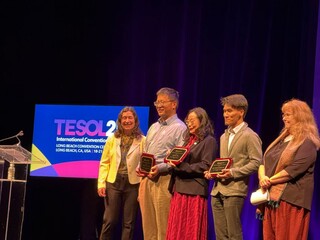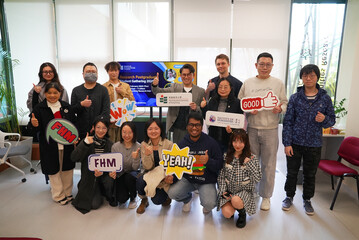BEd(CHI HIST) Programme Bridges Curriculum Gap in Chinese History Education to Cultivate All-rounded Future Educators
- 30 May, 2023
- Feature Stories
- Faculty of Humanities
"Who doesn't love stories?" For Dr Hui Kwok Wai, Associate Programme Leader of the Bachelor of Education (Honours) (Chinese History) programme, history is not only about facts and figures. "Studying history is also about understanding other people's stories and experiences – and thinking in this way makes history much more interesting."
For secondary school and university students, memorising historical events can be intimidating. Having been a student, Dr Hui believes that passionate teaching arouses students’ learning interests. Therefore, she endeavours to cultivate a passion for teaching in aspiring educators.
“Animated Chinese History for Curious Minds Project”
Brings History To Life in Classrooms
Dr Hui participated in the "Animated Chinese History for Curious Minds" Project, which has become an effective tool for teachers to enhance students' engagement in the classroom. Since its launch in 2018, the animation has already gained over seven million views. It aims to break the stereotype that “history is boring” and cultivate students' interest in Chinese History and culture.
Dr Hui believes that rote learning is far from the essence of learning history. In fact, university-level Chinese history courses put due emphasis on analysing historical materials and cultivating students’ critical thinking skills. With the ongoing debates surrounding the subject of Chinese History, Dr Hui believes that the key is how we approach history. She expressed that staying objective and factual is paramount in conducting historical research.
Beyond Traditional Curriculum: Cultivating Students’ Holistic Thinking
In the current Hong Kong education system, Chinese History is a mandatory subject for junior secondary school students. The BEd(CHI HIST) Programme offered by EdUHK since 2015, is tailored to address the local curriculum and aims to nurture all-rounded history educators. It not only equips students with disciplinary knowledge in Chinese History, but also exposes students to Western theories and materials.
Dr Hui encourages students to take more Chinese History and History electives, in addition to the core subjects. This would enable students to develop a more comprehensive understanding of the discipline and better equip themselves for their future careers. The programme offers internship opportunities to students, which allow them to apply their learnings in real classrooms. The internships are divided into two stages, and students are required to have a solid understanding of at least one pedagogy before beginning their internships. By the end of the programme, students will have gained invaluable hands-on experience, preparing them for successful careers in education.
"History of the People's Republic of China"
Now a Compulsory Course Under Curriculum Reform
The local three-year Chinese History curriculum in junior forms primarily focuses on the history before the establishment of the People's Republic of China in 1949. Since the curriculum seldom delves into contemporary Chinese History, some graduates reflected that they encountered difficulties in teaching this particular historical period. To address the gap in the local curriculum, the university introduced the mandatory course "History of the People's Republic of China".
"History is an ever-evolving subject, and time never stands still," says Dr Hui. "Modern Chinese history only covers events up to 1949, but we are now in 2023—it is therefore essential to introduce a new course that focuses on contemporary Chinese History." She hopes the curriculum reform will better equip future graduates with the necessary skills and knowledge to become professional history teachers.
Gain Cultural Exposure in Diversified Learning Experience
To broaden students’ horizon, the programme offers Cultural Exchange Programme as part of the learning experience. Dr Hui led students to visit various universities on mainland China, such as Fudan University, Tsinghua University, and Nankai University, so that they could gain exposure to different teaching and learning methods. Although the lessons on the mainland may not be as interactive as those in Hong Kong, she believes that using Mandarin as a medium of instruction greatly benefits students' language training. In addition, she also took her students to visit different historical sites and museums during their stay to deepen their understanding of various historical periods.
Apart from academic exchanges, the exchange programme also offers valuable cultural experiences to students. According to Dr Hui, some students gained a better understanding of the lifestyle on mainland after spending 10 days there. “They even used local mobile apps to order food delivery at night!”, she remarked. These experiences allowed students to immerse themselves in a new cultural environment, which could be helpful in their future endeavours.
The programme provides students with a comprehensive learning experience that equips them with professional historical knowledge and diversified teaching skills. Upon graduation, students can apply to become registered teachers. Besides teaching professions, students are also well-trained for various career fields, such as publishing, arts and culture, and civil service.






